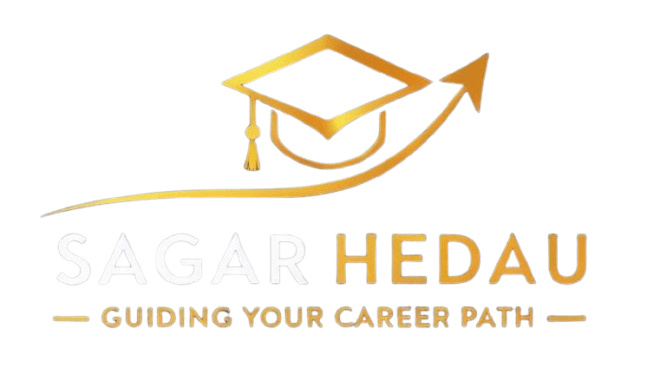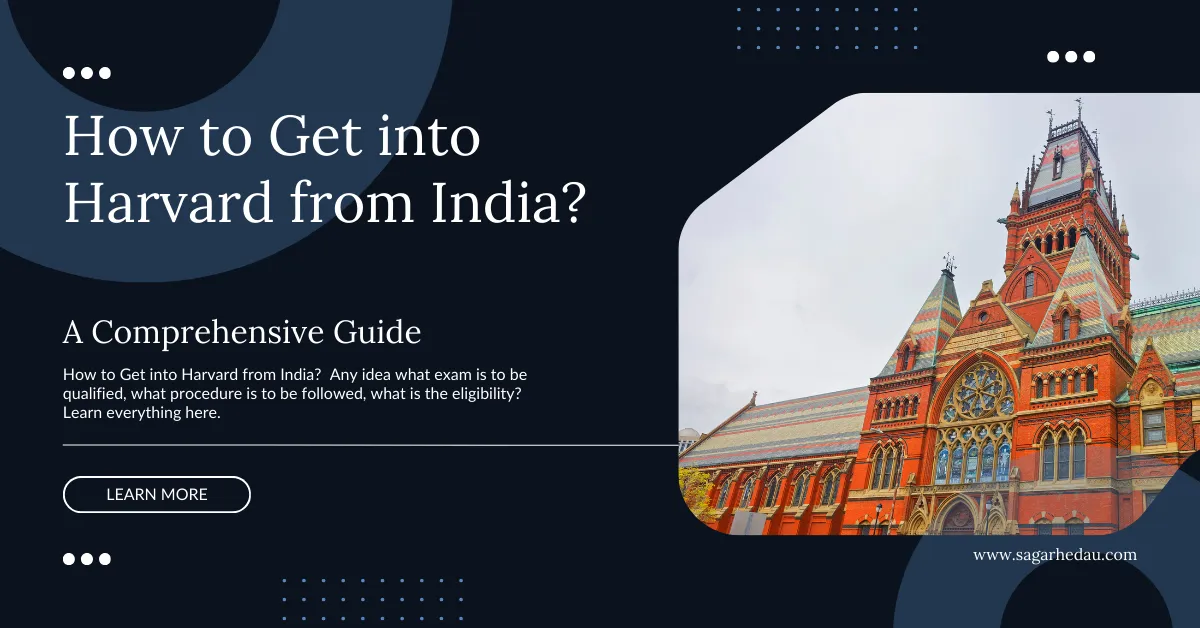Dreaming of studying at Harvard is an aspiration shared by many students around the world. For Indian students, the journey to one of the most prestigious universities in the world can seem exciting and daunting. With its competitive admission process, world-class faculty, and vast academic resources, Harvard sets high standards. Still, with the right preparation, perseverance, and strategy, it’s possible to turn this dream into reality.
In this guide, we’ll explore key steps to help Indian students navigate the complex path to getting into Harvard. From understanding the admission criteria and preparing a standout application to excel in academics and extracurriculars, this blog will provide insights about How to get into Harvard from India and how you can increase your chances of getting in. Let’s embark on this journey together!
Introduction: Understanding Harvard’s Prestige
Harvard University stands as a symbol of academic excellence, renowned globally for its rigorous programs, distinguished faculty, and influential alumni network. Established in 1636, it is the oldest institution of higher learning in the United States. Admission into Harvard is highly competitive, with an acceptance rate of approximately 4.6%. Factors contributing to its prestige include:
- Academic Excellence: Harvard offers top-tier education, cutting-edge research, and extensive resources.
- Notable Alumni: Graduates include multiple U.S. presidents, Nobel laureates, and industry leaders.
- Global Influence: Harvard’s contributions impact various fields such as law, business, medicine, and technology.
So, if you wish to be a part of this academic heritage, you need to know how to get into Harvard from India as an Indian student looking to study abroad.
The Indian Education System vs. Harvard Requirements
The Indian education system and Harvard’s admission requirements are distinct in various aspects:
- Curriculum Differences:
- Indian boards like CBSE/ICSE focus on breadth and rote learning.
- Harvard values depth, analytical skills, and extracurricular excellence.
- Grading Scales:
- Indian grading systems typically use percentages.
- Harvard assesses applications based on GPA converted to a 4.0 scale.
- Standardised Tests:
- Indian students often take competitive exams like JEE or NEET.
- Harvard requires SAT/ACT scores and looks for high percentile rankings.
- Extracurricular Activities:
- Indian students often focus on academics.
- Harvard emphasises well-rounded applicants with leadership roles, sports, arts.
Understanding these differences is crucial for Indian applicants aiming to meet Harvard’s criteria.
Types of Courses at Harvard: Undergraduate and Postgraduate
Harvard offers a wide range of courses catering to both undergraduate and postgraduate students. Here are the main categories:
Undergraduate Courses
- Bachelor of Arts (A.B.)
- Bachelor of Science (S.B.)
- Joint Concentrations
- Honours Programmes
Postgraduate Courses
- Master’s Degrees
- Master of Arts (M.A.)
- Master of Science (M.S.)
- Doctoral Degrees (Ph.D.)
- Professional Degrees
- Harvard Law School (J.D.)
- Harvard Business School (M.B.A.)
Specialised programs and interdisciplinary options are also available to meet diverse academic interests.
How to Get into Harvard from India
Eligibility Criteria and Academic Requirements
To be considered for admission to Harvard from India, applicants must meet the following criteria:
- Academic Excellence:
- A high GPA in high school/twelfth standard.
- Exceptional scores in standardised tests like SAT or ACT.
- Language Proficiency:
- Proof of English proficiency via TOEFL or IELTS if English is not the applicant’s first language.
- Extracurricular Achievements:
- Significant involvement in extracurricular activities, leadership roles, or community service.
- Letters of Recommendation:
- Strong recommendation letters from teachers or mentors who can attest to the applicant’s abilities and character.
- Personal Statement:
- A compelling personal essay that outlines the applicant’s motivation, experiences, and goals.
- Application Form:
- A completed Common Application or Universal College Application form.
Building a Strong Academic Profile
A stellar academic profile is essential for Harvard admissions.
- Course Selection
- Opt for rigorous courses.
- Emphasise STEM if inclined towards sciences; Humanities otherwise.
- Grade Point Average (GPA)
- Maintain a GPA above 3.8.
- Seek academic counselling if necessary.
- Standardised Tests
- Prepare for SAT/ACT exams.
- Strive for scores in the 95th percentile.
- Advanced Placement (AP) Exams
- Enrol in AP courses.
- Score 4 or 5 in AP exams.
- Research and Projects
- Undertake independent research.
- Present findings in academic journals or conferences.
Standardised Tests: SAT, ACT, TOEFL, and IELTS
Standardised tests are crucial for Indian students aiming to get into Harvard.
- SAT or ACT: Harvard accepts both the SAT and ACT. Students should choose one based on their strengths. The SAT focuses on evidence-based reading, writing, and maths. The ACT includes English, maths, reading, science, and an optional writing test.
- TOEFL or IELTS: For non-native English speakers, Harvard requires the TOEFL or IELTS to assess English proficiency. The TOEFL includes reading, listening, speaking, and writing tests. The IELTS covers listening, reading, writing, and speaking.
Preparation and high scores in these tests significantly enhance admission chances.
Extracurricular Activities and Leadership Roles
Showcasing diverse extracurricular activities and leadership roles is vital.
- Participation in Clubs and Societies:
- Stem-related clubs (Robotics, Coding, Science)
- Arts and cultural societies (Drama, Music, Debate)
- Leadership Roles:
- Club President or Team Captain roles
- Organising major school events and initiatives
- Community Service:
- Volunteer projects
- Internships with non-profit organisations
- Sports and Athletics:
- Representing schools at state or national levels
- Unique sports or activities that highlight diverse interests
Highlighting these roles demonstrates commitment, leadership, and the ability to impact communities positively.
Crafting an Exceptional Personal Statement
Creating a stellar personal statement is crucial for Harvard applications.
- Highlight Unique Experiences: Share personal stories that showcase individuality, resilience, and growth.
- Academic and Extracurricular Balance: Demonstrate a well-rounded personality by balancing academic achievements with extracurricular passions.
- Clear and Concise Writing: Avoid overly complex language; prioritise clarity and brevity.
- Reflect Genuine Passion: Emphasize genuine interest in the intended field of study and future aspirations.
- Seek Feedback: Obtain constructive feedback from mentors, teachers, or professionals.
- Revise and Edit: Thoroughly revise and proofread to eliminate grammatical errors and enhance clarity.
Letters of Recommendation: Who and How?
Choosing the right recommenders and ensuring strong letters of recommendation are crucial. Ideal recommenders include:
- Teachers who have taught the applicant in core subjects.
- Mentors who have supervised significant extracurricular activities.
- Employers who can attest to professional competencies.
To secure strong letters:
- Provide recommenders with ample notice.
- Supply a résumé and details of achievements.
- Offer a summary of the applicant’s goals.
Strong letters should highlight the applicant’s academic prowess, leadership qualities, and unique contributions. Ensure letters are submitted on time, adhering to Harvard’s specific guidelines.
Preparing for Interviews: What to Expect
Harvard interviews are designed to assess candidates beyond academic achievements.
- Format: Typically, interviews are conducted either in person or via video calls.
- Structure: Expect a conversational format focusing on personal experiences, motivations, and aspirations.
- Common Questions: Interviewers often ask about leadership roles, extracurricular activities, and long-term goals.
“Tell me about a significant challenge you faced and how you overcame it.”
- Preparation: Practise common questions, be honest, and reflect on unique experiences.
- Attitude: Demonstrate confidence, curiosity, and a genuine interest in Harvard’s mission and values.
Remember, interviews are as much about personality as they are about intellect.
Financial Aid and Scholarships for Indian Students
Harvard University offers several financial aid programmes for international students, including those from India.
- Need-Based Aid: Harvard meets 100% of the demonstrated financial need for all admitted students.
- Harvard Scholarship Programmes: Harvard offers its scholarships based on financial need.
- External Scholarships:
- Inlaks Shivdasani Foundation Scholarships
- Narotam Sekhsaria Scholarships
- JN Tata Endowment
Indian students should also investigate specific Harvard Fellowships available for various disciplines. Students are encouraged to apply early to maximise their chances of securing financial support.
“No student should be deterred from applying due to financial constraints.”
Navigating the Application Process: Key Deadlines and Tips
To navigate the Harvard application process effectively, begin early and stay organised. Key deadlines to note are:
- Early Action Deadline: November 1.
- Regular Decision Deadline: January 1.
Key tips for the process:
- Organise Documents: Gather transcripts, recommendations, and standardised test scores.
- Write Essays: Invest time in crafting personal, reflective essays.
- Seek Recommendations: Request letters from teachers and supervisors who know you well.
- Prepare for Interviews: Be ready for potential alumni interviews.
- Monitor Deadlines: Regularly check application portals for updates.
Common Mistakes to Avoid
- Lack of Research on Harvard: Applicants often fail to understand the unique culture and academic environment of Harvard. Comprehensive research is essential.
- Generic Application Essays: Crafting a tailored, compelling essay that reflects individual experiences and perspectives is crucial. Avoid recycling generic essays.
- Over-emphasis on Academics: Solely focusing on grades and test scores can be detrimental. Harvard seeks well-rounded individuals with diverse interests.
- Ignoring Extracurricular Activities: Involvement in meaningful extracurricular activities demonstrates leadership and commitment.
- Underestimating Recommendation Letters: Strong, personalised recommendations from credible sources provide valuable insights into the applicant’s character and abilities.
Success Stories: Learning from Indian Students at Harvard
Poonam Sharma
Poonam, an Economics major at Harvard, exemplifies dedication.
- Preparation: Intensive SAT prep and a strong application profile.
- Achievements: Internships with top firms, participation in international debates, and strong community service.
Vivek Patil
Vivek’s journey underscores the importance of research.
- Academics: Stellar CBSE scores.
- Extracurriculars: International Science Olympiad medalist.
- Essays: Personal stories that resonated with the admission committee.
“Determination and persistence paved their way to Harvard,” Vivek often remarks.
Their stories inspire countless aspirants, illustrating that with the right mix of academics, extracurriculars, and a compelling narrative, success is attainable.
Conclusion: Making Your Harvard Dream a Reality
Achieving the goal of studying at Harvard University from India is a challenging yet attainable ambition.
- Start with an exceptional academic record and high standardised test scores.
- Engage in extracurricular activities that demonstrate leadership and impact.
- Ensure all application materials, including essays and recommendation letters, reflect personal authenticity and unique contributions.
- Planning and preparation well in advance are critical to meeting deadlines and requirements.
- Seek guidance from alumni or mentoring programs to gain valuable insights.
- Be prepared for the financial commitment, including exploring scholarships and financial aid opportunities.
Diligence, perseverance, and a strategic approach are essential.


